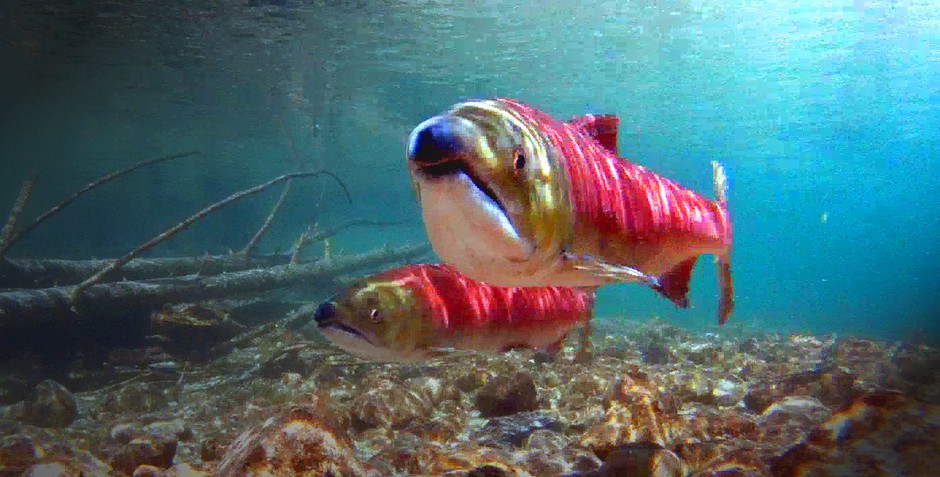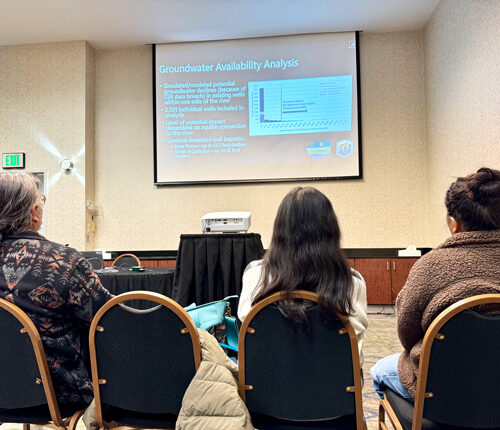
Appeals Court Affirms Order For More Spill Over Dams To Help Columbia River Salmon
The federal government will have to spill more water over Columbia and Snake river dams starting Tuesday in an effort to help young salmon migrating to the ocean. This will make up the biggest planned water spill over dams for the U.S. Army Corps of Engineers.
The requirement comes after the Ninth Circuit U.S. Court of Appeals on Monday affirmed an order for federal dam managers on the Columbia and Snake rivers to comply with a judge’s ruling from last year. The National Marine Fisheries Service had appealed U.S. District Judge Michael Simon’s ruling to increase spill over dams.
“After more than 20 years of federal failure, salmon are in desperate need of help now,” said Todd True, Earthjustice attorney representing conservation, fishing, and clean energy advocates in the case, in a statement.
“The measures the court upheld will give salmon a fighting chance while the federal government catches up to the scale and urgency of what the law requires to protect these fish from extinction.”
Spilling water in the springtime over the tops of dams — rather than sending it through turbine blades — is seen by conservation groups as an essential way to protect threatened and endangered salmon and steelhead. The increased spill will take place from April to mid-June.
Advocates say it allows juvenile salmon to quickly pass over dams, rather than sending them through the structures, which can cause traumatic damage to the fish as they head to sea.
“It’s tragic that the federal agencies are still ignoring their own science in fighting spill at every step of the way,” said Glen Spain, with the Pacific Coast Federation of Fishermen’s Associations, in a news release.
Conservation groups say this is the fourth time since 2005 that the U.S. District Court has ordered increased spill over the dams.
“This is a short-term measure, but it’s a critical one, given that salmon populations — especially in the last few years — are headed in the wrong direction. They need more help right now, not less,” said Joseph Bogaard, executive director of Save Our Wild Salmon.
The move has been controversial. First, opponents say, less water through dams means less power generated. Second, they say, too much spill can lead to too much dissolved oxygen in the water, which also causes problems for fish.
“We do know that some spill can be very good for fish, but too much spill can really harm fish or kill them,” Terry Flores, director of Northwest RiverPartners said in an earlier interview with EarthFix.
The Bonneville Power Administration estimates the increased spill could cost up to $40 million per year, which will be passed onto ratepayers under a “spill surcharge.”
Dam managers say spilling too much water incorrectly over the dams can create eddies, where young fish are vulnerable to predators, and it can eventually damage the dams. Officials have been testing new spill plans on miniature dams to make sure they find the right solution.
U.S. Rep. Dan Newhouse, R-Washington, recently co-signed a letter opposing increased spill on the Columbia and Snake rivers.
“We are very concerned by the unintended consequences this forced spill order could have on our shared constituents, as well as the rest of the Pacific Northwest. … This is simply not worth the risk. We must come to the aid of our constituents to stop the $40 million bill that could land on their backs this year alone,” Newhouse wrote, along with Rep. Cathy McMorris Rogers, R-Washington, and Jaime Herrera Beutler, R-Washington.
The increased spill will start Tuesday on the Snake River and April 10 on the Columbia River.
Correction: Tuesday, April 3: An earlier version of this story mischaracterized the action of an appeals court. It affirmed an order by a federal judge.
Copyright 2018 Earthfix
Related Stories:

Snake River water, recreation studies look at the river’s future
People listen to an introductory presentation on the water supply study findings at an open house-style meeting in Pasco. After they listened to the presentation, they could look at posters

Exposición en Richland destaca contribuciones de latinos en Hanford
El Museo REACH de Richland presenta una nueva exposición titulada “Migration to Community”, que destaca las contribuciones de los hispanos y latinos en Hanford.

An exhibition in Richland highlights the Latino contributions at Hanford
The Reach Museum in Richland is featuring a new exhibition called Migration to Community, which highlights the contributions of Hispanics and Latinos at Hanford.















